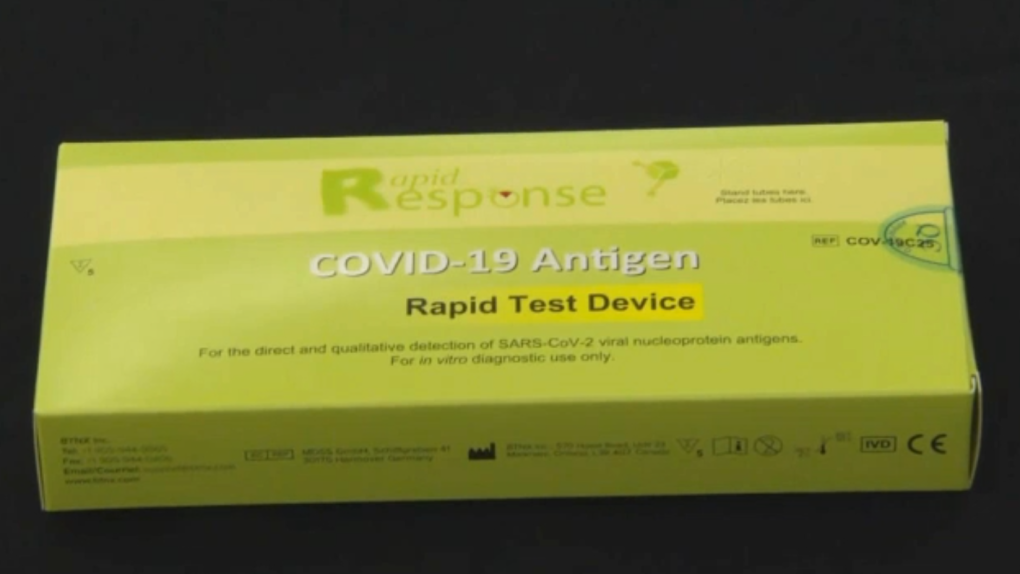B.C. expands COVID-19 rapid test access to all adults

For the second time this week, the B.C. government has lowered the age for accessing free COVID-19 rapid tests through pharmacies.
As of Wednesday, all B.C. residents ages 18 and older can pick up rapid antigen test kits at participating pharmacies across the province.
On Monday, the province reduced the eligibility age to 30.
While most other provinces made rapid tests available to the general public weeks or months ago, B.C. has been slower to roll them out. Health officials have said their strategy for distributing rapid tests focused on making the tests available for at-risk populations first.
Eligible B.C. residents can pick up one kit of five tests every 28 days from one of more than 1,300 participating pharmacies.
Those looking to pick up a test kit must provide their personal health number. Test kits can be picked up for others, as long as the person picking them up can provide the name, personal health number, and date of birth of the tests' intended recipient.
According to the province, nearly 7.8 million tests had been shipped to pharmacy distributors as of Monday, March 21, and more than 2.7 million tests had been dispensed to the public through pharmacies.
Those numbers represent individual tests. Since the tests are distributed in packages of five, the number of test kits shipped to pharmacy distributors and handed out to the public is significantly lower.
According to the Ministry of Health, as of Tuesday, March 22, a total of 580,909 kits had been dispensed.
Because it's been less than 28 days since the province first began distributing tests through pharmacies, each of those test kits distributed has gone to a different person.
B.C.'s total population was almost 5.2 million in 2021, suggesting that only a little over 11 per cent of residents had picked up a test kit by Tuesday.
Of course, not everyone in the province was eligible to pick up a test kit as of Tuesday, and data from the ministry shows that those ages 70 and older - who have been eligible for the longest - have picked up the most test kits.
The ministry said pharmacies had distributed 260,248 test kits to those ages 70 and older as of Tuesday, with 178,969 kits distributed to those ages 60 to 69, 86,820 to those ages 50 to 59, 40,834 to those ages 40 to 49, 13,806 to those ages 30 to 39 and 232 to people under age 30 or of unknown age.
The figures provided suggest roughly 37 per cent of B.C.'s 70-and-older population has received an at-home test kit from a pharmacy, with smaller percentages of younger age groups taking advantage of the free tests so far.
Pharmacies are not the only place British Columbians can access rapid tests, however. Many of those over age 70 live in long-term care or other congregate living facilities, which received rapid tests much earlier in the pandemic.
Similarly, those with children in B.C. schools would have begun receiving rapid tests in late January, when the province began sending home one test kit per child.
CTV News asked a ministry spokesperson how the rapid test pharmacy distribution program has performed relative to the ministry's expectations and received the following statement:
"Our data shows there is increasing demand for rapid tests, which makes us confident that British Columbians have and continue to do everything they can to keep themselves and their communities safe."
Including its targeted distribution of tests to at-risk populations, the B.C. government says it has now distributed more than 34.7 million rapid tests since the pandemic began. The province said it expects to receive another 4.4 million tests from the federal government "in March and early April."
CTVNews.ca Top Stories

W5 Investigates A 'ticking time bomb': Inside Syria's toughest prison holding accused high-ranking ISIS members
In the last of a three-part investigation, W5's Avery Haines was given rare access to a Syrian prison, where thousands of accused high-ranking ISIS members are being held.
'Mayday!': New details emerge after Boeing plane makes emergency landing at Mirabel airport
New details suggest that there were communication issues between the pilots of a charter flight and the control tower at Montreal's Mirabel airport when a Boeing 737 made an emergency landing on Wednesday.
Federal government posts $13B deficit in first half of the fiscal year
The Finance Department says the federal deficit was $13 billion between April and September.
Canadian news publishers suing ChatGPT developer OpenAI
A coalition of Canadian news publishers is suing OpenAI for using news content to train its ChatGPT generative artificial intelligence system.
Weather warnings for snow, wind issued in several parts of Canada
Winter is less than a month away, but parts of Canada are already projected to see winter-like weather.
BREAKING Supreme Court affirms constitutionality of B.C. law on opioid health costs recovery
Canada's top court has affirmed the constitutionality of a law that would allow British Columbia to pursue a class-action lawsuit against opioid providers on behalf of other provinces, the territories and the federal government.
Cucumbers sold in Ontario, other provinces recalled over possible salmonella contamination
A U.S. company is recalling cucumbers sold in Ontario and other Canadian provinces due to possible salmonella contamination.
Nick Cannon says he's seeking help for narcissistic personality disorder
Nick Cannon has spoken out about his recent diagnosis of narcissistic personality disorder, saying 'I need help.'
Real GDP per capita declines for 6th consecutive quarter, household savings rise
Statistics Canada says the economy grew at an annualized pace of one per cent during the third quarter, in line with economists' expectations.

































